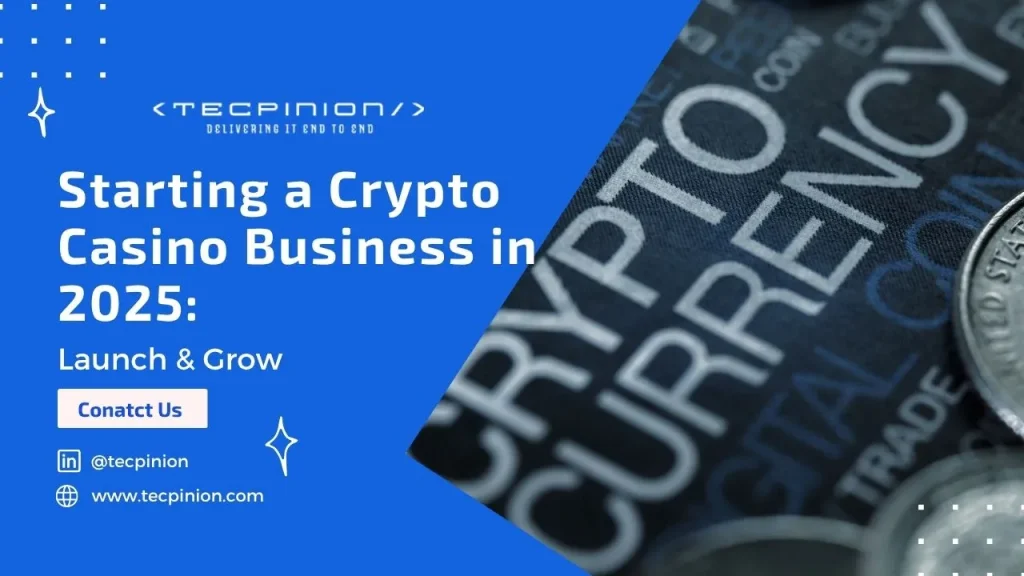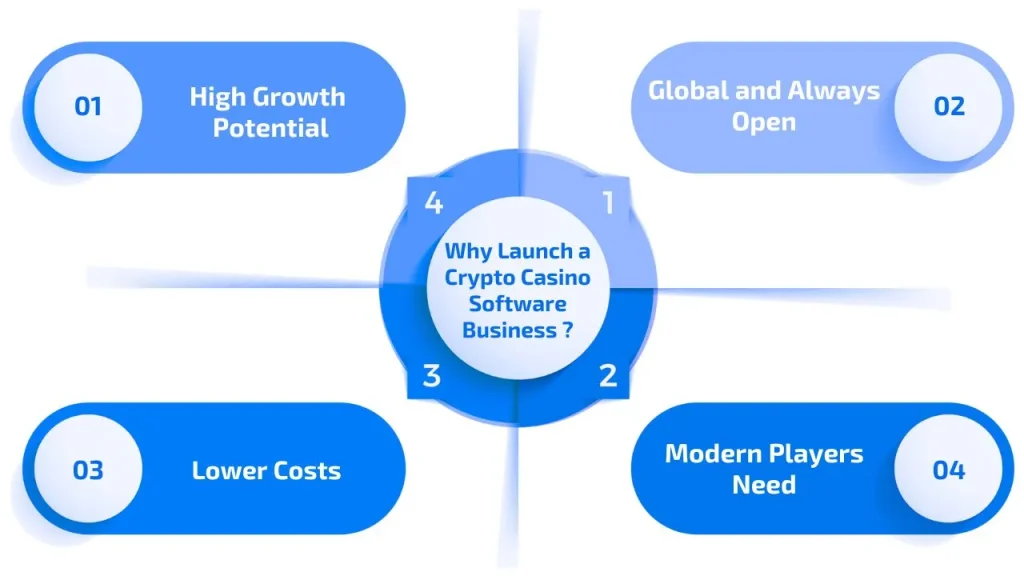How to Start a Crypto Casino Software Business in 2025: Launch, Scale & Succeed

Table of Contents
- Introduction
- Why Launch a Crypto Casino Software Business Now?
- Understanding the Crypto Gambling Market
- Navigating Legal & Regulatory Compliance in 2025
- Core Casino Software Features That Win in 2025
- Seamless Payments & Crypto Wallet Integration
- Top Crypto Casino Software Providers
- Future Outlook: Where Crypto Casinos Are Headed
- Conclusion
- Why Tecpinion is an Ideal Crypto Casino Partner
- FAQs
Introduction
Driven by blockchain technology and cryptocurrencies, the online gaming sector is changing dramatically. The rise of bitcoin casino software, a solution that offers players all around the world distributed, safe, and borderless enjoyment, is among the most fascinating developments. As Web3 adoption accelerates, launching an online crypto casino is becoming not just a lucrative opportunity but a strategic move for those ready to innovate in the iGaming space. Blockchain is reshaping the casino software industry, enabling provably fair games, instant crypto payouts, and NFT-based rewards. This guide explores how to launch, scale, and sustain success in this fast-growing space, from tech and legal setup to player engagement and innovation.
Current Market Stats
The crypto gambling industry has experienced explosive growth, from $50 million in 2019 to $250 million in 2024, showing strong potential for continued growth through 2028.
Why Launch a Crypto Casino Software Business Now?

- High Growth Potential: Crypto casinos are growing fast as more people use blockchain and crypto. Younger, tech-savvy players trust these platforms for their fairness and transparency.
- Global and Always Open: Crypto casinos work 24/7 and can be accessed from anywhere in the world. No borders, no banks — just instant play and payments.
- Lower Costs: They cost less to run than traditional casinos. No buildings, fewer staff, and many processes are automated with smart contracts.
- Modern Players Need: People today want privacy, speed, and freedom. Crypto casinos offer:
- Anonymous sign-up
- Instant payouts
- No currency restrictions
Understanding the Crypto Gambling Market
A. Types of Crypto Casinos
-
Provably Fair Casinos
1. Use cryptographic algorithms to prove the fairness of each game outcome.
2. Transparent, tamper-proof systems where players can verify results themselves.
3. Common in dice games, blackjack, and slots.
4. The target audience is trust-conscious crypto users. -
Hybrid Platforms
1. Combine fiat and crypto payment options.
2. Appeal to a wider user base, including crypto newcomers.
3. Usually centralized but offer crypto features like wallets and fast withdrawals.
4. Ideal for scaling and gradual market adoption. -
Decentralized Casinos (DApps)
1. Fully built on blockchain, often using smart contracts for automation.
2. Non-custodial (users control their funds) and censorship-resistant.
3. Can be community-governed via DAOs.
B. Player Segments in the Crypto Gambling Ecosystem
-
Crypto Natives
1. Long-time crypto holders looking to spend or multiply tokens.
2. Comfortable with volatility, wallets, and DeFi concepts.
3. Value transparency, speed, and privacy. -
Casual Bettors
1. Transitioning from traditional online gambling.
2. May prefer hybrid casinos that offer both fiat and crypto options.
3. Motivated by bonuses, ease of use, and recognizable games. -
NFT Collectors & Gamers
1. Interested in gambling platforms that offer NFT-based rewards or NFT-integrated games.
2. Driven by collectibles, ownership, and gamified experiences. -
DeFi Users
1. Technically savvy and financially motivated.
2. Attracted to features like staking, liquidity mining, or yield-generating tokens tied to gameplay.
3. May participate in DAO governance if available.
C. Competitor Analysis & Niche Opportunities
Current Market Leaders
- Stake.com – Massive brand power, sponsorships, and fast-growing.
- BC.Game – Offers multiple altcoins, NFT elements.
- Rollbit – Gamifies crypto trading with casino elements.
Identifiable Gaps & Niche Opportunities
-
Esports Betting
1. Combine real-time esports matches with live crypto betting.
2. Appeals to younger, digitally native audiences.
3. Often under-served in current crypto gambling platforms. -
Tokenized Rewards & Loyalty Systems
1. Offer a native utility token to reward activity (e.g., wagering, referrals).
2. Can be staked, traded, or used in-game.
3. Drives user retention and ecosystem growth. -
Cross-Platform Integration
1. Integrate with DeFi protocols, NFT games, or metaverse worlds.
2. Could offer virtual casino spaces or VR poker experiences. -
Localized Platforms
1. Tailor experiences for specific regions or language groups underserved by global brands.
2. Combine crypto UX with localized support, payment onramps, and cultural games.
The crypto gambling market is diverse and rapidly evolving. Success lies in understanding the types of platforms, the motivations of different user segments, and exploiting gaps in current offerings—whether through esports, NFTs, tokenized rewards, or decentralized gameplay. Choosing the right niche and execution model can position a new entrant for fast traction and long-term success.
Navigating Legal & Regulatory Compliance in 2025

As more countries update their laws to cover crypto gambling, compliance is becoming both easier to manage and more critical to success. In 2025, regulators increasingly demand clear KYC (Know Your Customer) and AML (Anti-Money Laundering) procedures, crypto wallet verification, and proof of fair gameplay.
Operators should work with legal experts and obtain licenses from reputable sources like Curaçao, Malta, or the Isle of Man if they are to keep ahead. Not only is it important to be clear and rule-abiding, but it also distinguishes one in a market under increasing regulation.
-
Key Licensing Jurisdictions
Securing a gambling license is essential to operate legally and gain user trust. The most popular jurisdictions for crypto casinos include:
- Curaçao
- Longtime go-to for online casinos, including crypto platforms.
- Pros: Cost-effective, fast processing, broad permissions.
- Cons: Historically looser regulations, which may impact reputation (though reforms are underway in 2025).
- Anjouan (Comoros)
- Emerging low-cost licensing jurisdictions are gaining traction among crypto gambling startups.
- Pros: Very accessible and crypto-friendly.
- Cons: Less established, potentially more scrutiny from banks and partners.
- Malta (MGA License)
- Highly respected and EU-compliant.
- Pros: Strong reputation, access to European markets.
- Cons: Expensive and rigorous; not always suitable for crypto-focused startups unless fully compliant.
- Kahnawake (Canada)
- Crypto-tolerant, especially for platforms targeting North American markets.
- Strong track record with online casinos.
- Gibraltar, Isle of Man
- Mature frameworks, supportive of crypto under specific conditions.
- Targeted at more established operators due to higher costs and stricter requirements.
-
Crypto-Specific Compliance Challenges
Operating a crypto casino comes with unique legal hurdles:
- KYC (Know Your Customer)
- Verifying user identity is a core requirement in many jurisdictions to prevent fraud and money laundering.
- Balancing anonymity (valued by crypto users) with compliance is tricky.
- Use third-party KYC providers (e.g., Jumio, Sumsub) with flexible verification levels.
- AML (Anti-Money Laundering)
- Regulatory bodies demand systems to detect suspicious transactions.
- Crypto transactions must be monitored using blockchain analytics tools (e.g., Chainalysis, Elliptic).
- Must report large transactions and unusual patterns.
- Jurisdictional Restrictions
- Some countries ban online gambling or crypto gambling entirely (e.g., the U.S., China).
- Operators must geo-block restricted regions and comply with IP, payment, and user restrictions.
- VPN detection and user screening tools are essential.
-
Importance of Legal Counsel and Compliance Infrastructure
Launching a crypto casino without proper legal planning is risky and potentially illegal:
- Hire Specialized Legal Counsel
- Work with lawyers experienced in crypto and iGaming.
- They’ll help navigate licensing, tax obligations, token compliance, and data protection (e.g., GDPR).
- Build Compliance into the Product
- Use smart design: KYC flows, user consent, risk scoring.
- Document policies for audits, disputes, and customer protections.
- Plan for Scalability
- Start with a flexible license (e.g., Curaçao), then migrate to stricter jurisdictions (e.g., Malta) as you grow.
- Monitor global trends — new crypto-friendly licenses and regulatory sandboxes are emerging in regions like Latin America, Asia, and Africa.
In 2025, the crypto gambling space will be more legally mature but still fragmented. Securing the right license, implementing proactive KYC/AML processes, and hiring legal counsel from day one are non-negotiable. Smart compliance is not just about avoiding penalties — it builds trust, attracts partners, and opens doors to sustainable growth.
Core Casino Software Features That Win in 2025
Provably Fair Algorithms & Open-Source Smart Contracts
- Provably Fair Gaming:
- Uses cryptographic methods (like SHA-256 hashing) to prove game results are not manipulated.
- Players can independently verify game outcomes, creating trust through transparency instead of relying on the platform’s honesty.
- Smart Contract Integration:
- Games and payouts can run on-chain, removing the need for a centralized authority.
- Open-source contracts increase transparency and attract tech-savvy and DeFi-native users.
- Popular Use Cases: Dice games, blackjack, crash games, coin flips.
Live Dealer Games with Crypto Tipping
- Immersive Experience:
- Live casino games (roulette, baccarat, poker) are streamed in real time with professional dealers.
- Creates a human connection that automated games can’t replicate.
- Crypto Tipping:
- Players can tip dealers instantly using Bitcoin, Ethereum, or platform-native tokens.
- Adds a social layer to gameplay and increases engagement.
- Emerging Trend: Tipping also extends to other players or streamers within the platform, blurring the line between gaming and social media.
AI-Based Personalization & Retention Tools
- Dynamic Personalization:
- AI tailors content based on playstyle, risk tolerance, and wagering habits.
- Personalized game suggestions, bonus offers, and UI adjustments drive user satisfaction.
- Smart Retention Engines:
- Predict when a player might churn and automatically trigger incentives (e.g., cashback, free spins, exclusive challenges).
- Adaptive loyalty programs adjust rewards based on player value.
- Behavioral Analytics: Monitor engagement in real time to optimize promotions and ensure responsible gambling practices.
NFT Integration for In-Game Items & Loyalty Rewards
-
- Unique Player Assets:
- NFTs represent avatars, badges, VIP access passes, or limited-edition items.
- Can be earned through gameplay or purchased on integrated marketplaces.
- Unique Player Assets:
-
- Loyalty & Gamification:
- Players “level up” and unlock NFT-based rewards based on their activity.
- Encourages deeper engagement and long-term retention.
- Tradability & Interoperability:
- NFTs can be traded between players or used across games and platforms.
- Integrating with larger metaverse ecosystems creates network effects.
- Loyalty & Gamification:
The most successful crypto casinos in 2025 combine provable fairness, human interaction, personalized experiences, and Web3 innovation. Players expect control, transparency, and rewards that go beyond just monetary value. Embracing AI, NFTs, and decentralized infrastructure is no longer optional — it’s essential to stand out and scale.
Seamless Payments & Crypto Wallet Integration
A frictionless payment system is critical to any crypto casino’s success. In 2025, users expect speed, flexibility, and full control over their assets — and that starts with wallet integration.
Custodial vs. Non-Custodial Wallets
- Custodial Wallets: Managed by the platform. Easier onboarding, smoother UX, but users don’t fully control their funds.
- Non-Custodial Wallets: Users connect wallets like MetaMask or Phantom. Offers full asset control and aligns with Web3 values, but adds complexity for newcomers.
- Trade-off: Custodial = convenience; Non-custodial = decentralization & trustless operation.
Multi-Coin Support
Top platforms support a wide range of assets:
- Major Coins: BTC, ETH, USDT, USDC
- Emerging Chains: SOL, AVAX, MATIC, BNB — lower fees and faster transactions
- Stablecoin Focus: Essential for reducing volatility in gameplay and payouts.
Optimized Transactions
- Instant Deposits & Fast Withdrawals: Users expect real-time performance — delays lead to churn.
- Gas Fee Optimization: Use layer-2 scaling (e.g., Arbitrum, Polygon) or aggregate transactions to minimize user costs.
- Lightning & Layer-2 Support: Enables near-zero-fee BTC or ETH transactions, improving accessibility and retention.
Top Crypto Casino Software Providers

1. Tecpinion
- Overview: Tecpinion is one of the pioneers in the crypto casino software space. Their platform is highly regarded for its flexibility and full-stack iGaming solutions.
- Key Features:
- Turnkey and white-label solutions for launching crypto casinos.
- Seamless integration of multiple cryptocurrencies (Bitcoin, Ethereum, Tether, Litecoin, Dogecoin, and more).
- Full back-office, affiliate system, and CRM tools.
- Reputation: Known for stability, security, and being crypto-native since 2013.
2. Evolution Gaming
- Overview: While not originally a crypto-focused company, Evolution Gaming is the gold standard for live dealer casino games and is frequently integrated into crypto casinos via aggregators.
- Key Features:
- High-quality video streaming.
- Immersive live games such as Lightning Roulette, Crazy Time, and Live Blackjack.
- Studios in multiple countries for regulatory compliance.
- High-quality video streaming.
- Crypto Role: Integrated through platforms like SoftSwiss or custom APIs by crypto operators.

3. Pragmatic Play
- Overview: A versatile developer offering slots, live dealer games, bingo, and virtual sports. Very popular in both fiat and crypto casinos.
- Key Features:
- Widely available on top crypto casinos through aggregators.
- Fast-paced gameplay is suitable for crypto gamblers.
- Strength: Frequent game releases and tournaments.
4. BetSoft Gaming
- Overview: BetSoft is famous for its cinematic 3D slot games and innovative table game mechanics.
- Key Features:
- Available in almost all major crypto casinos.
- Supports provably fair gaming in select titles.
- Unique Selling Point: Strong focus on visual storytelling in slots.

5. BGaming
- Overview: A spinoff from SoftSwiss, BGaming was one of the first providers to offer provably fair gaming, essential in the crypto gambling world.
- Key Features:
- Every game includes a built-in “provably fair” verification system.
- Strong focus on crypto-optimised game types and formats.
- Why It Stands Out: One of the few providers truly built for crypto from day one.
6. Play'n GO
- Overview: A heavyweight in mobile slot development. Their games are high-performing and often optimised for lower-bandwidth conditions.
- Top Games: Book of Dead, Reactoonz, Legacy of Dead.
- Key Features:
- Not directly crypto-native but highly sought-after via aggregation.
- Often featured in hybrid casinos accepting both fiat and crypto.
- Highlights: Intuitive gameplay, great RTP, and regular releases.
Would You Like to Explore More about Crypto Casino Software?
Future Outlook: Where Crypto Casinos Are Headed
The future of crypto casino software points to even deeper decentralization and immersive innovation. DAO (Decentralized Autonomous Organizations) run casinos are emerging, where governance, profit-sharing, and operations are controlled by token holders, shifting power from companies to communities.
AR/VR and metaverse integration will bring fully immersive gambling experiences, allowing users to enter virtual casinos, interact with live dealers, and play games in 3D environments powered by blockchain.
At the same time, global regulation is catching up. Expect stricter compliance standards and the rise of licensed DeFi gaming protocols that blend smart contracts with transparent governance, setting a new benchmark for security and legitimacy in Web3 gambling.
The next wave of crypto casinos won’t just be platforms — they’ll be decentralized, user-owned entertainment ecosystems.
Conclusion
Launching a crypto casino in 2025 is a great chance to grow in a fast-moving market. With more people using crypto and new tech, these casinos are changing online gaming by being more transparent and player-friendly. With the right mix of advanced software, regulatory compliance, and user-focused design, operators can unlock new revenue streams while delivering next-level entertainment. Success will favor those who invest in robust platforms, strategic partnerships, and future-ready features. With expert support from casino software provider like Tecpinion, launching a competitive, compliant crypto casino is not just possible—it’s the smart move forward.
Why Tecpinion is an Ideal Crypto Casino Partner
- Proven Expertise: Years of experience in blockchain and crypto casino development.
- Secure & Scalable Platforms: Built for performance, safety, and growth.
- Compliance-Ready Solutions: Stay ahead of regulatory requirements with confidence.
- White-Label Customization: Fast-track your launch with tailored, ready-to-deploy solutions.
- End-to-End Support: From backend infrastructure to front-end design—we cover it all.
- Market-Focused Approach: Designed to meet the dynamic needs of the crypto gambling industry.
FAQs
- Is it legal to launch a crypto casino?
Yes, but depending on where you live will determine whether you have to obey crypto rules and possess a gaming license.
- What cryptocurrencies can I use?
Among popular choices are Bitcoin, Ethereum, USDT, BNB, and others. Supporting several blockchains guarantees consumers more access and adaptability.
- How do I make sure the games are fair?
Use “provably fair” systems, where players can check each game result using cryptographic tools.
- Do I need a license?
Yes. Licenses from places like Curacao or Malta are often used for crypto casinos.
- How long does it take to launch?
With a white-label solution, it takes about 4–6 weeks, depending on how much you customize and the license process.
Want to know more
about Casino Software
read out the Related Blogs
Recent Post
-
How To Start a Gambling Website? Step-by-step Guide on Creating a Casino Site
-
The Ultimate Guide to Casino Gamification: Why It Makes Gambling More Fun and More Addictive
-
How to Set Up an Online Casino in Malta: A Complete Guide
-
Next-Gen Online Casino Monetization Models for 2026
-
White Label vs Turnkey: Which iGaming Platform to go for?


